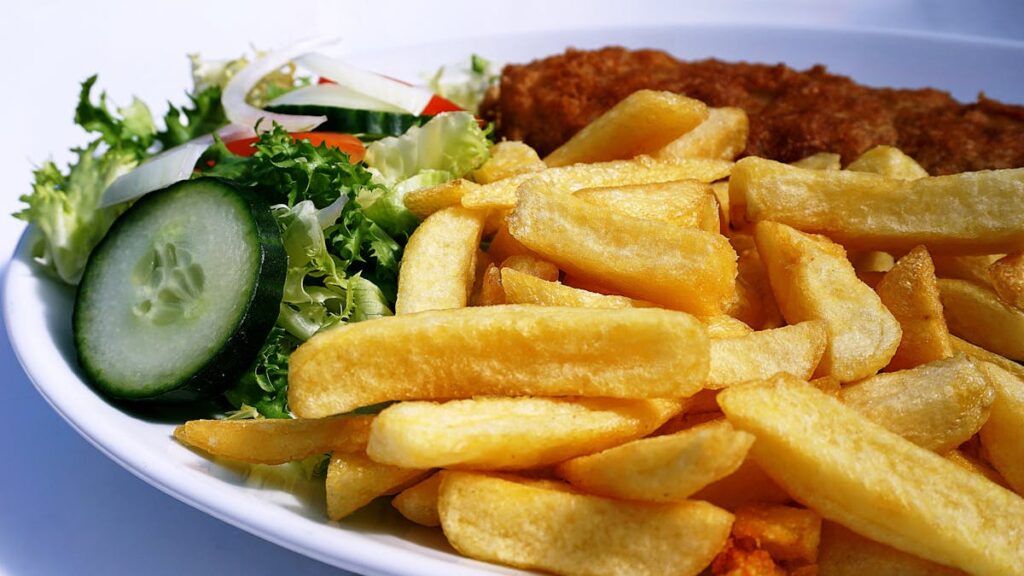Thinking of starting a chips business in Kenya?
You’re in the right place.
Fast food, particularly chips, has become a staple in urban areas across Kenya.
With the increasing demand from busy professionals, students, and even families looking for a quick meal, this industry is more promising than ever.
Despite health trends warning against “junk food,” chips cafés continue to thrive, especially in cities like Nairobi.
The market is growing, driven by urbanization, and the availability of fast food options remains attractive to many.
In this post, I’ll walk you through how to start a chips business in Kenya—from what you need, to avoiding common pitfalls.
Is a chips business profitable?
Yes, a chips business in Kenya can be quite profitable. Here’s why:
- High Demand: Chips (French fries) are a popular snack enjoyed by a wide range of people in Kenya, from students to office workers.
- Low Production Costs: The primary ingredients, potatoes and cooking oil, are relatively inexpensive and readily available in Kenya.
- Flexible Pricing: Depending on your target market and location, you can adjust your pricing to maximize profits.
- Scalability: You can start small with a basic setup and gradually expand your operations as your business grows.
However, like any business, profitability depends on various factors:
- Location: A high-traffic area with a good customer base is essential.
- Quality: Using good quality potatoes and maintaining hygiene standards are crucial for attracting and retaining customers.
- Pricing: Finding the right balance between affordability and profitability is key.
- Competition: Understanding and differentiating yourself from competitors can help you stand out.
- Marketing and Customer Service: Effective marketing strategies and excellent customer service can build a loyal customer base.
- Efficiency: Managing costs, minimizing waste, and streamlining operations are essential for maximizing profits.
What You’ll Need to Start a Chips Business in Kenya
Before jumping into the business, it’s important to understand the essentials you’ll need.
Starting a chips business in Kenya involves a combination of licenses, equipment, and proper planning.
Here’s a breakdown of the key items and their associated costs:
- Deep Fryer – You’ll need this for frying the chips. A basic fryer can cost anywhere between Kshs. 15,000 to Kshs. 100,000 depending on its size and brand.
- Potato Cutter – This will help you cut potatoes into perfect chips. It costs about Kshs. 3,000 to 5,000.
- Warmer – A warmer is essential for keeping your chips fresh and ready for customers. They can range from Kshs. 5,000 to 30,000.
- Cash Register – While not mandatory, a cash register is useful for tracking sales and reducing cash leakages. A basic model can go for around Kshs. 10,000.
- Fridge or Freezer – Especially if you buy raw materials in bulk, a freezer or fridge helps keep perishables fresh, costing around Kshs. 30,000 to 40,000.
Licenses and Certifications:
- County Business Permit – The cost varies depending on the county, ranging from Kshs. 7,000 to 40,000.
- Health License – You must pass a health inspection to get this, and it costs around Kshs. 3,000.
- Fire License – Required for fire safety, averaging Kshs. 1,500.
Budgeting for these items is crucial, but don’t forget that you’ll also need an initial stock of potatoes, sauces, sodas, and other related items.
How much do I need to start chips business in Kenya?
The capital needed to start a chips business in Kenya varies depending on several factors, including the scale of the business, location, equipment used, and desired level of sophistication.
Here’s a breakdown of some potential costs:
1. Small-Scale/Home-Based Business
This can be started with as little as Ksh 5,000 to Ksh 20,000.
This typically involves manually peeling and cutting potatoes, using basic frying equipment, and selling in small quantities locally.
2. Medium-Scale Business
This may require an investment of Ksh 50,000 to Ksh 200,000.
You may invest in semi-automatic equipment for peeling and cutting, larger frying capacity, and packaging materials for wider distribution.
3. Large-Scale/Commercial Production
This could require a significant investment of several million Kenyan shillings.
It involves fully automated production lines, advanced packaging solutions, branding, and extensive marketing efforts.
Here’s a list of some specific costs to consider:
- Equipment: Potato peelers, slicers, fryers, de-oiling machines, packaging machines, weighing scales, etc.
- Raw materials: Potatoes, cooking oil, salt, flavorings, and packaging materials.
- Business permits and licenses: Costs vary depending on the location and scale of the business.
- Rent: If you’re not operating from home, you’ll need to factor in rental costs for a suitable space.
- Utilities: Electricity, water, and gas costs.
- Labor: If you plan to hire employees.
- Marketing and advertising: Costs to promote your products.
Step-by-Step Guide on How to Start a Chips Business in Kenya
1. Identify Your Location
Location is everything. You need to position your chips café in a high-traffic area—think urban centers, near office buildings, or bus stations.
In Nairobi, for instance, chips businesses thrive in busy areas like Moi Avenue and Tom Mboya Street.
Your location will not only determine your customer flow but also influence your pricing and branding strategy.
2. Plan Your Capital Investment
Starting a chips business in Kenya requires a minimum capital of around Kshs. 300,000, but it could go as high as Kshs. 5 million depending on the location and size of the café.
Here’s a basic breakdown of what you might need:
- Deep Fryer – Kshs. 40,000
- Potato Cutter – Kshs. 4,000
- Warmer – Kshs. 15,000
- Renovation & Equipment – Kshs. 50,000
- Licenses – Kshs. 30,000
- Rent + Goodwill – Kshs. 150,000
3. Set Up Your Equipment and Layout
Once you’ve secured a location, it’s time to organize the layout of your café.
Aim for a smooth flow from the payment counter to where food is served.
The interior should be appealing, clean, and functional.
If you are short on space, consider a standing or takeaway café to reduce seating costs.
4. Source the Best Potatoes
Not all potatoes are created equal.
Varieties like Zangi and Ndogo are preferred for making chips because they have high dry matter, which means they absorb less oil and result in crispier fries.
Building a reliable relationship with suppliers will save you headaches down the line.
Most chips businesses source their potatoes from markets like Wakulima in Nairobi.
5. Prepare and Serve High-Quality Chips
The secret to success in the chips business lies in how you prepare your fries.
Blanching—boiling and then cooling the potatoes—can make a huge difference in taste. Using the right type of cooking oil is another critical factor.
Always ensure that your oil is fresh to avoid an unpleasant aftertaste that can turn customers away.
Profit Estimates of a Chips Business in Kenya
Profit estimates for a chips business in Kenya can vary significantly depending on several factors, such as the scale of the business, location, efficiency, and pricing strategy.
However, here are general estimates and examples to give you a better idea:
Small-Scale/Home-Based Business:
- Investment: Ksh 5,000 – Ksh 20,000
- Daily Sales: Ksh 1,000 – Ksh 3,000
- Profit Margin: 40-50%
- Estimated Monthly Profit: Ksh 12,000 – Ksh 45,000
Medium-Scale Business:
- Investment: Ksh 50,000 – Ksh 200,000
- Daily Sales: Ksh 5,000 – Ksh 10,000
- Profit Margin: 30-40%
- Estimated Monthly Profit: Ksh 45,000 – Ksh 120,000
Large-Scale/Commercial Production:
- Investment: Several million Kenyan shillings
- Daily Sales: Highly variable depending on distribution and market reach
- Profit Margin: 20-30%
- Estimated Monthly Profit: Highly variable, potentially reaching hundreds of thousands or even millions of Kenyan shillings.
Examples:
A study by the Kenya National Farmers’ Federation (KENAFF) indicated that a group of 20 farmers processing potato crisps could generate a profit of Ksh 4,100 from a single bag of potatoes costing Ksh 2,500.
Numerous small-scale vendors operating from roadside stalls or small shops report making a decent living from their chips businesses, with daily profits ranging from a few hundred to several thousand shillings.
Tips for Success in Starting a Chips Business in Kenya
To ensure your chips business stands out and thrives, here are some tips to guide you:
1. Prioritize Quality
When it comes to food, quality is king.
Ensure that your chips are always crispy, well-cooked, and delicious.
This starts with selecting the right potato variety.
As mentioned earlier, Zangi and Ndogo varieties work best because they produce long, aesthetically appealing chips that customers love.
Quality doesn’t end with the food—ensure your kitchen, service, and overall cleanliness are up to standard.
A clean café attracts more repeat customers and positive word-of-mouth.
2. Provide Exceptional Customer Service
Service matters just as much as the food.
Make sure that your employees are friendly, efficient, and well-trained to serve customers promptly, especially during peak hours.
Quick service is vital in fast food. Ensure staff are polite, responsive, and maintain cleanliness standards.
Offering a superior customer experience, from how your staff interacts with customers to the presentation of the chips, will help create loyal customers.
3. Strategic Pricing
Price your products appropriately based on your target market and competition.
For instance, in Nairobi’s CBD, prices for a plate of chips range from Kshs. 120 to Kshs. 150 depending on the location and quality of the establishment.
Lower prices attract higher volumes of customers, especially in high-traffic areas, while premium pricing can work in more upscale settings.
However, don’t sacrifice quality for the sake of cutting costs—this could drive customers away.
4. Location is Everything
The location of your chips business will significantly impact its success.
High-traffic areas like Nairobi’s CBD or near colleges and office blocks are ideal.
According to the research, the most successful chips cafes are located in urban centers with diverse, middle-class populations who spend on fast food for convenience.
A strategic location not only brings in more customers but also helps establish a solid market presence.
5. Offer Variety
While chips will be your primary product, offering complementary items like sausages, smokies, bhajias, and sodas can increase sales.
Many successful fast-food outlets also serve chicken, with profits from chicken contributing significantly to their overall revenue.
If you have the resources, consider offering popular beverages like fresh juice or Coca-Cola products, as these are customer favorites that pair well with chips.
Common Mistakes to Avoid When Starting a Chips Business in Kenya
As with any business, there are some common mistakes that new entrepreneurs often make when starting a chips business.
Here’s how you can avoid them:
1. Mismanagement
One of the leading causes of failure in the chips business is poor management.
This can range from mismanaging staff to failing to track daily expenses and revenue.
For example, in many cafes, employees engage in under-the-table deals, selling food at a discounted price and pocketing the difference.
Implement proper cash controls like installing a cash register and regularly auditing sales to prevent such leaks.
2. Choosing the Wrong Location
Another mistake is selecting a location with insufficient foot traffic or a mismatch with your target audience.
For example, opening a chips café in an area dominated by low-income earners or heavy labor workers, who prefer meals like ugali and sukuma, may not yield the desired success.
Always assess your location carefully and understand your target customers.
3. Cutting Costs at the Expense of Quality
While it’s tempting to reduce expenses by buying lower-quality ingredients, this can backfire.
For instance, choosing low-grade cooking oil or potatoes will negatively affect the taste of your chips, which will quickly drive customers away.
Quality must always come first—use good ingredients and don’t compromise on preparation methods like blanching, which enhance the flavor and texture of your fries.
4. Lack of Consistency
Once you establish a loyal customer base, maintaining consistency is key.
Customers expect the same quality of chips and service every time they visit.
If the quality fluctuates or the service deteriorates, they will look for alternatives.
Ensure that your processes are standardized, and your staff is trained to deliver the same level of quality at all times.
Troubleshooting Common Problems in the Chips Business
Starting a chips business comes with its own set of challenges.
Here’s how to troubleshoot some of the most common issues:
1. Fluctuating Potato Prices
Potato prices in Kenya can fluctuate depending on the season.
To manage this, consider buying in bulk during low seasons and storing potatoes properly to avoid spoilage.
You can also build relationships with reliable suppliers to get better deals during price hikes.
For those looking to avoid the hassle of sourcing daily, frozen chips can be an alternative, though they require careful handling and storage to maintain quality.
2. Rising Operational Costs
Electricity, cooking oil, and staff wages are some of the major operational expenses in the chips business.
To reduce these costs without sacrificing quality, invest in energy-efficient equipment and source cooking oil in bulk to take advantage of lower prices.
Monitor your utility usage closely to avoid unnecessary waste.
3. Staff Turnover and Training
High staff turnover can disrupt operations, especially if new hires are not well-trained.
Invest in training your staff to ensure they understand your processes, from food preparation to customer service.
Offering competitive wages and creating a positive work environment will also help reduce turnover and keep your operations running smoothly.
Chips Business Alternatives in Kenya
Not all chips businesses are created equal.
Depending on your location and budget, you might want to explore different formats:
1. Takeaway Cafés
If you’re operating in a small space or want to minimize setup costs, consider a takeaway-only café.
These work well in busy urban areas like Nairobi, where people are looking for quick meals on the go.
Takeaway cafes reduce the need for seating and cut down on interior décor costs, allowing you to focus on product quality.
2. Standing Cafés
Another option is the standing café, where customers eat their chips on fixed counters without seating.
This setup allows you to maximize space and serve more customers in a shorter time, especially in high-traffic areas.
Standing cafés typically charge lower prices but can still be profitable due to high volume sales.
3. Bar Stools Fast Food Cafeterias
For areas with a more diverse or affluent clientele, offering seating with bar stools and counters provides a better customer experience.
These setups are typically more expensive but allow you to charge a premium for the added comfort and atmosphere.
When considering alternatives, always assess your target market and location.
A takeaway-only format might work in one area, while a full sit-down café could be more appropriate in another. Flexibility is key.
Conclusion
Starting a chips business in Kenya is a promising venture with a lot of potential.
Avoid common mistakes like mismanagement or compromising on quality, and you’ll be well on your way to a thriving chips café.
If you’re passionate about providing great food and can navigate the competitive fast-food landscape, there’s no reason why your chips business can’t succeed.
So, get started today—Kenya’s love for chips isn’t slowing down anytime soon.
Read also:
- How to Start a Small Fast Food Business in Kenya (Easy Way)
- Food Handlers Certificate Online Application in Kenya
- #8 Profitable Food Business Ideas in Kenya
- How to Start a Business in Kenya with Small Capital
FAQs
1. What are the most important licenses required to start a chips business in Kenya?
To legally operate a chips business, you need a County Business Permit (Kshs. 7,000 – 40,000), a Health License (Kshs. 3,000), and a Fire License (Kshs. 1,500). Additionally, all staff must have medical certificates to ensure they are fit to handle food.
2. How much capital is needed to start a chips business in Kenya?
For a basic setup, you need at least Kshs. 300,000. This covers essential equipment, licenses, and the first stock of potatoes and other items. For a larger, more premium café, the cost could go up to Kshs. 5 million, especially in high-demand areas like Nairobi’s CBD.
3. What are the best potatoes to use for chips in Kenya?
The best potatoes for chips are Zangi and Ndogo, as they have high dry matter content, making them crispy when fried and less oily. These varieties are also easier to peel and produce aesthetically appealing long chips.


